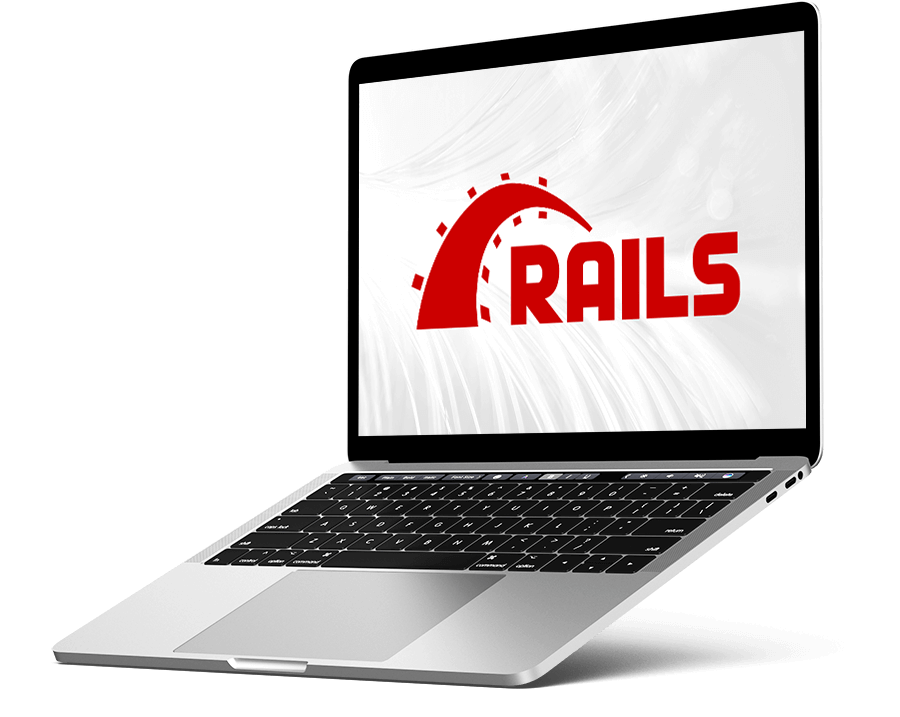
★ ★ ★ ★ ★ 4.9 Client Rated
TRUSTED BY THE WORLD’S MOST ICONIC COMPANIES.
★ ★ ★ ★ ★ 4.9 Client Rated

Quickly bring your ideas to life with our Ruby on Rails MVP development services. Rails provides a powerful foundation for developing minimum viable products, allowing for fast, cost-effective iterations that validate your concept. We utilize Rails’ robust set of tools and gems to build scalable and flexible MVPs, ensuring that you can test your vision and refine it for launch.
At Coderio, we specialize in crafting tailored web applications using Ruby on Rails, perfect for everything from content management systems (CMS) to dynamic social platforms. Our team leverages Rails’ core principles, such as Convention over Configuration and Don’t Repeat Yourself (DRY), to build scalable and maintainable applications that evolve seamlessly with your business needs. With a focus on efficiency and reliability, we deliver powerful web solutions that enhance user experience and support your strategic goals.
Optimize your Rails applications with cloud infrastructure to improve scalability, performance, and reliability. We offer cloud hosting and migration services, using platforms like AWS, Heroku, and Docker to move your Rails applications to the cloud or build new projects with a cloud-first approach. Our team ensures your applications are primed to leverage modern infrastructure and meet increasing demands efficiently.
Our team builds secure, high-performance APIs with Ruby on Rails that are optimized for use in single-page applications, mobile app backends, and microservices architectures. By leveraging Rails’ API mode, Active Model Serializers, and its modular design, we create APIs that are maintainable and easily integrated into larger systems, allowing your products to grow without constraints.
Keep your Rails applications future-ready with our modernization services. As technologies evolve, Rails apps can benefit from updates that improve security, performance, and functionality. Whether you need to upgrade to the latest Rails version, migrate to microservices, implement CI/CD pipelines, or transition to cloud infrastructure, we ensure your application remains competitive, secure, and scalable.
Transform your online retail experience with Rails-based e-commerce solutions that provide feature-rich, mobile-friendly shopping experiences. Our e-commerce services include developing custom stores, subscription platforms, and digital marketplaces with advanced functionalities, including secure user authentication, seamless checkout, and inventory management. By integrating frameworks like Spree Commerce and Solidus, along with API integrations like Shopify, we create high-performance platforms that drive sales and enhance customer satisfaction.
Maximize the potential of your Rails development with expert consulting. Our experienced Ruby on Rails developers offer strategic guidance, helping you plan, execute, and optimize your Rails projects. We collaborate closely to understand your objectives, provide insights on best practices, and help you achieve your project’s full potential.

Coca-Cola needed a predictive tool to anticipate customer churn and manage the risk of abandonment. The goal was to implement an early warning system to identify risk factors and proactively reduce churn rates, optimizing retention costs and maximizing customer lifetime value.

YellowPepper partnered with Coderio to bolster its development team across various projects associated with its FinTech solutions. This collaboration aimed to leverage our expertise and elite resources to enhance the efficiency and effectiveness of the YellowPepper team in evolving and developing their digital payments and transfer products.

Coca-Cola sought an intelligent customer segmentation system that could identify and analyze behavioral patterns across different market segments. The solution had to automatically adapt to new data, allowing for optimized marketing strategies and improved return on investment.

Coca-Cola faced the challenge of accelerating and optimizing the creation of marketing promotions for its various products and campaigns. Coca-Cola was looking for a solution to improve efficiency, reduce design and copywriting time, and ensure consistency in brand voice. Additionally, the company sought a flexible, customizable platform that would allow the creation of high-quality content while maintaining consistency across campaigns.

APM Terminals faced the challenge of automating the control of entries and exits at their port terminals. The existing process, which involved manual management of drivers, vehicles, and containers, was costly and prone to inefficiencies, delays, and errors.

Coca-Cola required an advanced solution to accurately forecast the demand for its products, enabling them to optimize inventory and efficiently plan resources. The main need was to implement a predictive system that could analyze complex patterns, seasonality, and trends to improve their supply chain and operations.

Openpay needed a substantial upgrade to its payment processing capabilities, particularly focusing on mobile applications. The aim was to integrate advanced technologies for secure credit card transactions and to enhance core business functionalities. The project demanded extensive technical expertise to support mobile payment initiatives and refine essential system processes.

Burger King approached us to enhance the performance of their back-end processes, seeking a team of specialists to address their specific tech needs.
Smooth. Swift. Simple.

We are eager to learn about your business objectives, understand your tech requirements, and specific Ruby on Rails needs.

We can assemble your team of experienced, timezone aligned, expert Ruby on Rails developers within 7 days.

Our Ruby on Rails developers can quickly onboard, integrate with your team, and add value from the first moment.
Ruby on Rails, often called Rails or RoR, is a powerful open-source framework designed to streamline and speed up web application development. Built using the Ruby programming language, Rails emphasizes simplicity and productivity, making it an excellent choice for developers who want to create scalable, feature-rich applications quickly and efficiently.
One of Rails’ defining features is its opinionated approach—Rails promotes “convention over configuration,” meaning it provides standard conventions to guide developers in structuring their applications. By following these conventions, developers can reduce repetitive tasks and focus more on creating impactful functionality, leading to faster development cycles and a more enjoyable coding experience.
Rails also incorporates the Don’t Repeat Yourself (DRY) principle, which minimizes redundancy in code, resulting in applications that are easier to maintain and expand. These principles, combined with a large ecosystem of libraries (or “gems”) and a supportive community, enable developers to build reliable, high-performance applications suited for everything from small projects to large-scale systems.
Highly adaptable and backed by a wealth of resources, Ruby on Rails is trusted by some of the world’s most recognized brands, including GitHub and Airbnb, for its ability to handle complex, data-intensive applications. Whether you’re aiming to launch a minimum viable product (MVP) quickly or looking to streamline workflows, Rails provides the foundation for creating robust, scalable web applications with ease.

High Reliability and Robustness
Ruby on Rails offers built-in error handling, data integrity features, and powerful tools for ensuring data accuracy and accessibility. These features contribute to the framework’s stability and make applications less prone to critical failures, providing a strong foundation for building reliable, production-ready applications.
Strong Security Features
Rails emphasizes security, with built-in protections against common vulnerabilities like cross-site scripting (XSS), SQL injection, and cross-site request forgery (CSRF). Rails also includes support for authentication and encryption, making it easier to safeguard sensitive data and protect applications from evolving threats.
Active and Supportive Community
With an extensive and highly active global community, Ruby on Rails benefits from continuous improvements, support, and knowledge sharing. Developers have access to a wealth of tutorials, online resources, and community-contributed gems, making it easier to troubleshoot issues, explore best practices, and stay current with the latest advancements.
Efficient Code Maintainability
Rails is built on the Model-View-Controller (MVC) architecture, which promotes a clear separation of concerns. This structure simplifies updates and helps prevent code conflicts, making it easier to maintain, refactor, and scale applications as they grow. The DRY (Don’t Repeat Yourself) principle further streamlines code management by minimizing duplication and enhancing readability.
Enhanced Developer Productivity
Rails accelerates development with its “Convention over Configuration” philosophy, which provides standard conventions that reduce decision fatigue and simplify coding tasks. Combined with a large ecosystem of pre-built libraries (gems) and tools, Rails enables developers to quickly build applications with less code, promoting rapid development cycles and faster time-to-market.
Scalability to Support Growth
Ruby on Rails applications can scale horizontally to meet increased traffic and business demands. Its flexible architecture allows applications to grow and adapt to new requirements efficiently, making Rails a valuable choice for businesses from startups to large enterprises that anticipate expanding user bases or complex requirements.
Ruby on Rails is a versatile framework that combines speed, security, maintainability, and scalability, making it a powerful option for companies looking to build feature-rich, high-performance web applications.

Ruby on Rails’ “Convention over Configuration” philosophy allows developers to skip repetitive setup tasks and follow built-in conventions, leading to faster development cycles. This, along with the framework’s extensive library of reusable code (gems), significantly speeds up development, making it ideal for startups and MVPs that need a quick time-to-market.
Rails’ open-source nature and the availability of numerous pre-built libraries reduce the need for costly, custom-built solutions. This cost efficiency makes Rails a valuable choice for companies looking to create high-quality applications without incurring large development expenses.
Rails includes many built-in security measures, such as protection against SQL injection, cross-site scripting (XSS), and cross-site request forgery (CSRF). These security features are implemented by default, giving applications a secure foundation and making it easier to meet industry standards in sensitive industries like finance and healthcare.
Rails applications are easily scalable to accommodate growing user bases and increasing traffic. With tools like caching, background job processing, and modular design, Rails allows developers to build applications that scale effectively, making it suitable for both startups and large-scale enterprise applications.
The Rails community is one of the most active in the development world, offering extensive resources, documentation, and support. Additionally, the ecosystem includes a vast selection of gems and plugins that enhance functionality, simplify development, and allow developers to incorporate complex features without starting from scratch.
For startups and innovators looking to validate ideas quickly, Rails offers an efficient path to building MVPs. Rails’ convention-driven framework, combined with its extensive library of pre-built components and active developer community, allows teams to rapidly prototype, iterate, and test product concepts without sacrificing quality.
Ruby on Rails is a popular choice for building comprehensive e-commerce platforms, with Shopify as a prime example. Rails offers a vast array of plugins and integrations that simplify the creation of interactive storefronts, secure payment processing, inventory management, and more, making it a strong foundation for modern online retail.
Rails is widely used for developing SaaS applications, thanks to its scalability, security, and rapid development capabilities. It enables the creation of scalable, secure software solutions that can adapt to various user needs, making it ideal for subscription-based applications that require frequent updates, high performance, and a secure infrastructure.
Rails is well-suited for building social networking sites due to its ready-to-use libraries and components, which streamline the development of essential social features like user profiles, messaging, and live updates. Rails makes it easy to add interactive features that keep users engaged, supporting real-time interactions and dynamic social experiences.
Rails’ Model-View-Controller (MVC) architecture and robust database integration make it ideal for developing complex content management systems. Rails-based CMS platforms are capable of handling large volumes of content, providing seamless data management, and supporting dynamic, responsive designs for improved user experience.
Rails is highly effective for building data-driven applications, including analytics and reporting tools. Its robust data processing capabilities allow developers to create solutions that analyze, visualize, and present complex datasets, often used in industries such as finance, healthcare, and logistics where accurate, real-time reporting is essential.
Rails applications rely on robust databases and caching systems to manage data efficiently and improve retrieval performance. These technologies ensure that applications handle large datasets seamlessly while providing quick response times for users.
Rails provides flexible options for creating and managing APIs, making it easy to integrate with other applications. These tools and libraries aid in API development, data serialization, and ensuring secure access control, supporting smooth data exchange and client-server interactions.
To build engaging and responsive user interfaces, Ruby on Rails can be paired with several popular frontend frameworks and tools that enhance client-side interactions and manage assets effectively.
Handling asynchronous tasks and optimizing server performance is critical in Rails applications. These tools facilitate job scheduling, server management, and deployment, ensuring smooth operations and responsiveness.
A variety of development tools and libraries support Rails developers by simplifying tasks like debugging, package management, and deployment. These resources make the development workflow more efficient and improve application performance.
Testing and quality assurance tools are essential in Rails development to maintain application security, reliability, and code quality. Rails integrates well with several testing frameworks and tools that help developers catch bugs early and ensure long-term code stability.
Rails and Django are two leading frameworks in web development, each trusted by industry giants like Airbnb, Shopify, Instagram, and Dropbox. Deciding between Rails and Django depends on your project’s unique needs, as each framework brings distinct advantages to the table. When to Choose Rails Rails is an ideal choice when speed and scalability are top priorities. Known for its “Convention over Configuration” approach, Rails accelerates development with built-in conventions and reusable components, allowing you to prototype, test, and iterate quickly. Rails is well-suited for projects with tight timelines, providing an agile foundation that scales effortlessly as your application grows. When to Choose Django Django is best suited for data-intensive or content-driven applications. Its powerful data modeling capabilities, integrated content management tools, and strong support for third-party integration make Django a strong choice for projects that require extensive data handling or complex backends. Django’s emphasis on “batteries-included” provides many built-in features that streamline the development of robust, data-focused applications. Rails and Django each offer powerful tools to support diverse project requirements, so choosing the right one depends on your project’s demands for scalability, speed, data handling, and content management.
We build high-performance software engineering teams better than everyone else.
Coderio specializes in Ruby on Rails technology, delivering scalable and secure solutions for businesses of all sizes. Our skilled Ruby on Rails developers have extensive experience in building modern applications, integrating complex systems, and migrating legacy platforms. We stay up to date with the latest Ruby on Rails advancements to ensure your project is a success.
We have a dedicated team of Ruby on Rails developers with deep expertise in creating custom, scalable applications across a range of industries. Our team is experienced in both backend and frontend development, enabling us to build solutions that are not only functional but also visually appealing and user-friendly.
No matter what you want to build with Java, our tailored services provide the expertise to elevate your projects. We customize our approach to meet your needs, ensuring better collaboration and a higher-quality final product.
Our engineering practices were forged in the highest standards of our many Fortune 500 clients.
We can assemble your Ruby on Rails development team within 7 days from the 10k pre-vetted engineers in our community. Our experienced, on-demand, ready talent will significantly accelerate your time to value.
We are big enough to solve your problems but small enough to really care for your success.
Our Guilds and Chapters ensure a shared knowledge base and systemic cross-pollination of ideas amongst all our engineers. Beyond their specific expertise, the knowledge and experience of the whole engineering team is always available to any individual developer.
We believe in transparency and close collaboration with our clients. From the initial planning stages through development and deployment, we keep you informed at every step. Your feedback is always welcome, and we ensure that the final product meets your specific business needs.
Beyond the specific software developers working on your project, our COO, CTO, Subject Matter Expert, and the Service Delivery Manager will also actively participate in adding expertise, oversight, ingenuity, and value.
Accelerate your software development with our on-demand nearshore engineering teams.